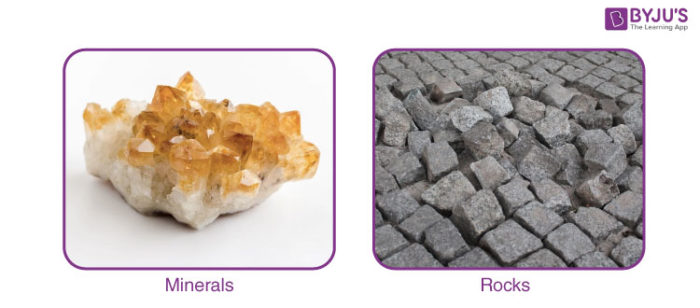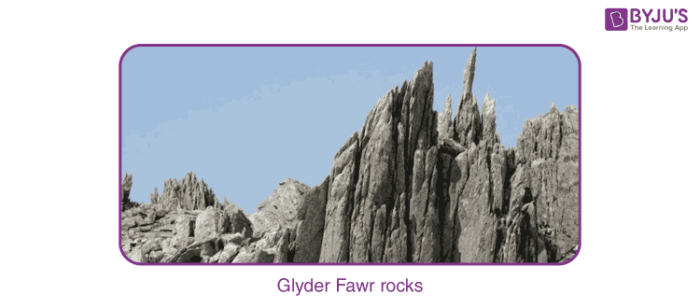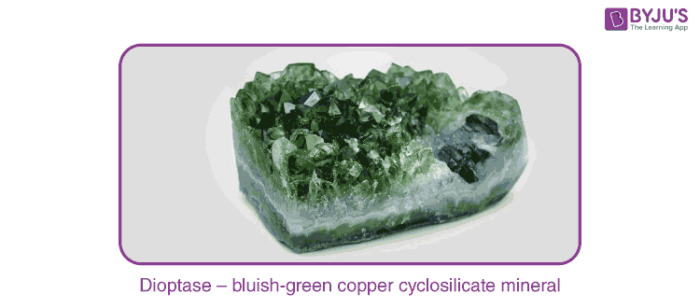Rocks and Minerals
Rocks and the minerals are known to be the building blocks of our active planet. They are the reason how the landscapes are formed and these provide all the necessary valuable resources needed within our environment. Knowing about these structures, we will be able to know about the events that have shaped our earth and those which will continue to shape our planet.
You would have learnt about the phrase ‘rocks and minerals’ at some stage of science in schooling. The reason for which we say ‘Rocks and minerals’ is because that they both are two different words. Rocks are composed of minerals, but minerals are not said to be composed of rocks. The Main rocks on the earth contain minerals such as magnetite, feldspar, quartz, mica, epidote etc. Minerals have a commercial value which is of very immense, whereas the rocks are mined in order to extract these minerals. These mined rocks are called as ores, and the residue of these rocks after mineral has been extracted from it is called as tailing.
Table of Contents
Facts about Rocks and Minerals
Ever wondered about the differences between a mineral and rock. What makes a rock different from a mineral. Let’s find out answers to these questions and other important relevant aspects of rock and mineral.

It is said that diamond is a girl’s best friend. Sapphires, Rubies and many other expensive gemstones are well known to represent royalty. But scientifically, should we use the word rock to describe a diamond.
The reason behind writing rocks and minerals is that both are two separate things. Minerals are not rocks and rocks are not minerals.
What are Rocks?
A Rock is an inorganic, solid and natural substance without any specific atomic structure or chemical composition. It is simple to remember that rocks are made up of two or more minerals. Examples of rocks involve limestone, granite, marble, slate and sandstone. Each of these rocks consists of different minerals that can be mixed up with the rock through different geologic processes.

Let’s consider granite. It mostly consists of three minerals namely: quartz, mica and feldspar. All these minerals exist in nature but mixed up with the rock. Sometimes you see big chunks of one of these minerals in granite, but when you take that stone as a whole, you have to call it rock.
What are Minerals?
A mineral is defined as a natural, inorganic solid substance which has a crystalline structure with a particular chemical composition. A mineral is said to possess different chemical composition which defines it crystalline shape and form. Whereas, the rock which is said to be comprised of several minerals, is generally classified based upon the process of its formation.

Let us study in detail about the uniqueness and various differences coming between Rock and minerals. Let’s break it down bit by bit.
Primarily, minerals are solid and exist naturally. Natural solids can be familiar like granite, sand wood and salt. According to the definition, minerals are inorganic. This reveals that minerals do not have living tissues.
It also describes that minerals consist of crystalline structure. This indicates the component atoms of the substance consist of 3-dimensional repeating arrangement. The above picture shows the arrangement of salt atoms. Salt is also known as sodium chloride since it is made up of two kinds of atoms: sodium and chlorine. Both are placed together in a 3-dimensional lattice which repeats over one another until a salt crystal is obtained. Sand is also small chunks of quartz of crystal made up of oxygen and silicon atoms.
Differences between Rocks and Minerals
Sometimes it is not easy to spot different minerals since there are rocks which are finer than granite. Slate is a stone which is made up of clay and clay consists of tiny particles. The particles can be apatite, minerals like quartz, feldspar, kaolinite and much more. But these crystals are not visible in the rock slate. The slate has the same texture and colour. But it cannot be called as a mineral since it does not have a regular chemical composition or atomic structure. Rocks are made up of minerals and minerals are independent and stand alone.
Sl.no |
Rocks |
Minerals |
| 1. | A rock is inorganic and a solid naturally-formed substance without any chemical composition or atomic structure. | A mineral is also a solid, inorganic, substance as that of the rock which has a definite crystalline structure as well as chemical composition. |
| 2. | Rock comprises minerals | A Mineral does not comprise rocks |
| 3. | Rocks exist in the tiny form which is also microscopic in nature. | These are said to be easily distinguishable in nature. |
| 4. | These occur in solid form on the earth’s crust. | Minerals are said to occur as mineral deposits. |
| 5. | Rocks exhibit some physical properties like colour, shape, lustre, texture and the pattern | The distinct process of rocks are colour, crystal habit, hardness, specific gravity, fracture, lustre, and tenacity |
| 6. | Some examples of rocks are sand, pebbles, shells, and few fragments of some material | Few examples of minerals are the fossil fuels such as coal, petroleum, etc. |
| 7. | Rocks do not possess definite shape and are found in different colours. | Minerals are said to have a definite shape and the colour. |
Recommended Videos
Types Of Rocks And Its Formation


well organised lesson